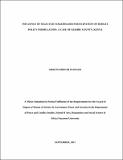| dc.description.abstract | In assessing the real development of any administrative unit world over, the World Bank Report 2014 proposes the importance of recognition of public input in all matters of public policy formulation and implementation. The process of devolution in Kenya has been formally underway since 2013 upon the promulgation of the 2010 constitution. According to the working paper No. 5 on the Review of County Initiatives in Public Participation in the roll out of devolution by the centre for devolution studies, (CDS 2015), some public enabling interventions have been sought to increase public participation at both national and county levels. The purpose of this research was to examine the influence stakeholders have on the Kiambu county budget formulation process. Participation is conceptualized in the normative democratic theory (theory of citizen participation) that deals with the moral foundations of democracy and institutions of democracy or representation in the pluralist republican theorem. Also used is the rational choice theory that implies directly to the possibility of rational policy decisions using the policy analysis process. As such stakeholders are involved in a cost-benefit rationalization process in their contribution to Kiambu county Budget formulation process. This research was conducted in Kiambu County, across the twelve (12) sub counties. The study utilized descriptive research design. This research targeted a population of 1,040, 742 with a sample of 384 respondents comprising of county public officers, and the youth. The study achieved a response rate of 72.7%. The study utilized ANOVA and regression analysis to test the hypothesis. The findings noticed that County public officers have a significant influence on the Kiambu County budget policy formulation (β =0.713). Also the youth participation was found to have a statistically significant influence on the county budget policy formulation ((β=0.253). All calculations were done to a 0.05 precision level. The primary data collection instrument was a questionnaire. In addition, this study found out a number of challenges affecting the participation of both the youth and the county public officers. Exclusion of youth interests from policy formulation was the main challenge identified by the youth respondents at 47%. Breakdown of communication channels between the youth and the county government was identified as the least challenge at 17% by the youth respondents. Majority of the Kiambu County Public officers (37%) identified incompetence as the main challenge affecting county officers. Different and dynamic levels of policy formulation was the least cited challenge at 17%. The reliability test of the study instrument, suggested a 0.7 reliability coefficient to 5% acceptable margin of error. The data analysis methods were managed by the SPSS Version 20 software. Data is presented using descriptive statistics pie-chart and tables. This study concludes that there exists a weak positive influence of (25.3%) youth participation and a strong positive influence of (71.3%) county public officer’s participation in the County budget policy formulation. The study recommends for practise: representation of the youth interests, civic education for sensitization in participation; for policy: reviewing of the existing participation framework to accommodate more stakeholders. | en_US |

